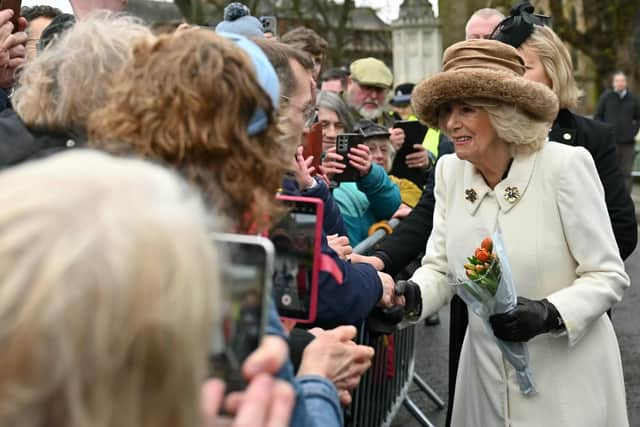Queen Camilla is right to encourage more people to take up reading - Sarah Todd
Dame Joanna Lumley compared the Queen’s stepping up to the plate with the spirit of the theatre, where if somebody is ill the understudy comes on and makes sure the show carries on. She also added that while many think she should be “blubbing in a corner” that is just not what the likes of Her Majesty are made of.
But before the Royal family’s recent challenges, it was when the Queen had her rescue dogs, Bluebell and Beth, embroidered near the trim of the gown she wore for the Coronation that, for me, she cemented her credentials.
Advertisement
Hide AdAdvertisement
Hide AdThe fact that she could have had any well-bred dog in the land, but that she adopted Beth in 2011 from South London’s famous Battersea Dogs and Cats Home and returned for Bluebell a year later was absolutely and utterly brilliant.


Apart from Jack Russell’s and other animals in general, the Queen’s love of reading is another string to her bow that endears her to this writer.
Her charity, The Queen’s Reading Room, commissioned a study which just last week released its findings. The research shows that spending as little as five minutes reading fiction increases concentration levels by 11 per cent and reduces stress levels by 20 per cent. Or, as Her Majesty so succinctly described it, five minutes of reading a day is “just as important” as getting our 10,000 steps and eating enough fruit and vegetables.
In spite of the Royal workload, which many half her 75 years would find exhausting, the Queen is well-known for making time to read to her grandchildren and is so very passionate about the importance of instilling a love of reading in the young.
Advertisement
Hide AdAdvertisement
Hide AdOut of touch really, now our own children are grown up, it was interesting talking to a friend with a younger brood the other day. She was telling us that there is a whole generation of teachers now who have grown up without probably ever picking up a book for pleasure.
Void of the bookworm traits of their older predecessors, many are at a loss when it comes to inspiring the next generation. They just do not have that love for the written word to make recommendation of interesting books to read and that is society’s loss. Modern education’s obsession with maths and science is pushing out music, drama, reading, sport and so-on.
Prime Minister Rishi Sunak’s announcement about this time last year that he wants all pupils in England to study some form of maths until the age of 18 can’t have helped.
Actor James Norton, who grew up in North Yorkshire, was among the first to criticise the plan, quite rightly saying we fail to nurture the arts at our nation’s peril.
Advertisement
Hide AdAdvertisement
Hide AdOf course, blessed mobile phones come into the equation (to use a mathematical term) with a football coach confiding the difficulties he has over recent years found getting players to turn up for training sessions.
He explained that whereas our generation would look forward to catching up with our mates mid-week, today’s youngsters are in constant communication through mobile apps such as Snapchat so there is not that same incentive to turn out. They can talk without leaving the comfort of their own homes, never mind having to pull their jogging bottoms on and run around a pitch. It is a trend that is echoed in many towns and cities across the country, with numbers of teams from pub pool to local league cricket on the decline.
The final word, this week, to Sir Ranulph Fiennes, who has questioned whether he would have completed his amazing exploration achievements if he had been born this century.
Fiennes, who has climbed Mount Everest three times and famously cut off two of his frostbitten fingers using a set of fretsaw blades to save himself a surgery bill following a trip to the North Pole in 2000, says that while modern technology such as GPS systems and satellite phones make exploration easier, they also make throwing in the towel and giving up easier.
Advertisement
Hide AdAdvertisement
Hide AdWith all that information at your fingertips, the explorer has pondered whether it is also easier to turn back and phone for help, rather than keeping going when the going gets tough.
Would all the amazing inventions and breakthroughs of the last century have been made if those behind them had not a) been inspired by books and b) been sat gawping at mobile phones rather than getting their fingers out and using their brains?
Comment Guidelines
National World encourages reader discussion on our stories. User feedback, insights and back-and-forth exchanges add a rich layer of context to reporting. Please review our Community Guidelines before commenting.